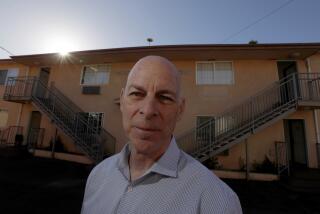Two Obama initiatives to address foreclosure crisis face hurdles
Two new initiatives from President Obama to address the foreclosure crisis — more help for struggling homeowners and aggressive investigations of financial firms — face significant hurdles as the nation’s real estate troubles linger in a volatile election year.
A new refinancing plan that expands on an existing initiative would allow homeowners who are current on their mortgage payments to retool their loans and save as much as $3,000 a year on payments. This expansion would be paid for by a new tax on large banks that Obama originally proposed in 2010 that has gone nowhere in Congress — and is unlikely to be approved by Republicans facing reelection in the fall.
The new investigative effort, to be co-chaired by New York Atty. Gen. Eric Schneiderman and four federal officials, will try to coordinate a number of existing federal and state probes into mortgage practices that led to the financial crisis.
Although Schneiderman promised Wednesday to move aggressively, many of those investigations have been going on for years. If the goal is to get criminal convictions — Obama called in his State of the Union address “to hold accountable those who broke the law” — it will be difficult to accomplish, said Thomas Gorman, an attorney at Dorsey & Whitney in Washington.
“Frankly, it’s coming to the table somewhat late,” said Gorman, a former enforcement official at the Securities and Exchange Commission. “There’s a huge body of information out there about what happened, and there have been very few criminal charges brought.”
Obama administration officials released few details about the initiatives Wednesday. There was not even a price tag on the refinancing plan, which will be part of legislation to be outlined in the coming days, the White House said.
The proposal builds off the Home Affordable Refinance Program, which was revamped last year to ease rules and reduce fees to make 1 million to 2 million homeowners eligible to take advantage of historically low mortgage rates. That plan applied only to loans owned or backed by mortgage finance giants Fannie Mae and Freddie Mac, but the new plan would apply to any mortgage, the administration said.
Jed Kolko, chief economist and head of analytics at real estate website Trulia.com, said other potential government initiatives would “help the housing market more directly.” Such initiatives could include converting foreclosed homes into rentals or increasing loan modifications.
“This is primarily economic stimulus,” Kolko said. “It puts money in the pockets of people with mortgages. It won’t impact the housing market much.”
“Underwater borrowers,” or those whose mortgage balances exceed the value of their homes, “will remain underwater, and you need to be current on your payments to refinance,” Kolko added.
The White House had no details on what Obama called “a small fee on the largest financial institutions” to offset the costs. In January 2010, Obama first proposed a “financial crisis responsibility fee” of 0.15% annually on the liabilities, excluding domestic deposits, of banks and other financial firms with at least $50 billion in assets. The fee would have raised $9 billion a year for 10 years.
But with strong opposition from the financial industry, Obama was unable to push the fee through the Democratic-controlled Congress. With Republicans now controlling the House, “the bank tax is definitely a poison pill,” said Edward Mills, a financial policy analyst at FBR Capital Markets & Co.
The new investigative effort will focus on “every aspect of the conduct that created the bubble and crash,” including the origination of mortgages and the packaging of them into securities, Schneiderman said. The unit will be part of the existing federal Financial Fraud Enforcement Task Force, which Obama created in 2009.
“We’re undertaking a more coordinated effort to pull together all of the various strands of investigations relating to the conduct that created the mortgage-backed securities bubble and led to the market crash,” Schneiderman told reporters Wednesday. “We’re now making a concerted effort to pull everything together and move forward aggressively to address these issues.”
Some liberal groups have been pushing for a broader investigation into the financial crisis and praised the initiative.
“By launching this investigation, President Obama will take a crucial step toward holding the 1% on Wall Street accountable for the big bank fraud that nearly torpedoed the economy,” said Justin Ruben, executive director of MoveOn.org.
But Anthony Sanders, a professor of real estate finance at George Mason University, said the new unit would be regulatory overkill and was designed to pressure banks to agree to a proposed $25-billion settlement with federal officials and many state attorneys general to address foreclosure paperwork problems.
“This could have been a last-ditch effort to push them to the finish line,” Sanders said of the settlement talks.
Schneiderman has been one of the most aggressive state attorneys general in investigating the actions of financial firms and others leading up to the housing bust. Along with California Atty. Gen. Kamala D. Harris, Schneiderman has balked at broadly releasing banks from legal liability as part of the foreclosure settlement talks.
They and several other attorneys general are concerned that the immunity would be so broad that it would preclude other investigations into the causes of the crisis.
A spokesman for Schneiderman said he would not sign on to any settlement that would limit his ability to investigate the mortgage crisis. Meanwhile, a spokesman for Harris said the attorney general believes that the current settlement proposal is inadequate for Californians.
Despite Obama’s announcements, California House Democrats on Wednesday asked to meet with him to appeal for more aggressive action to deal with foreclosures, including putting in place a plan to reduce the principal on underwater mortgages.
“We’ve met with everybody else in the administration with no satisfaction that they fully understand the magnitude of this problem with respect to the families that we represent,” Rep. George Miller (D-Martinez) said.
Staff writer Richard Simon contributed to this report.
More to Read
Inside the business of entertainment
The Wide Shot brings you news, analysis and insights on everything from streaming wars to production — and what it all means for the future.
You may occasionally receive promotional content from the Los Angeles Times.











